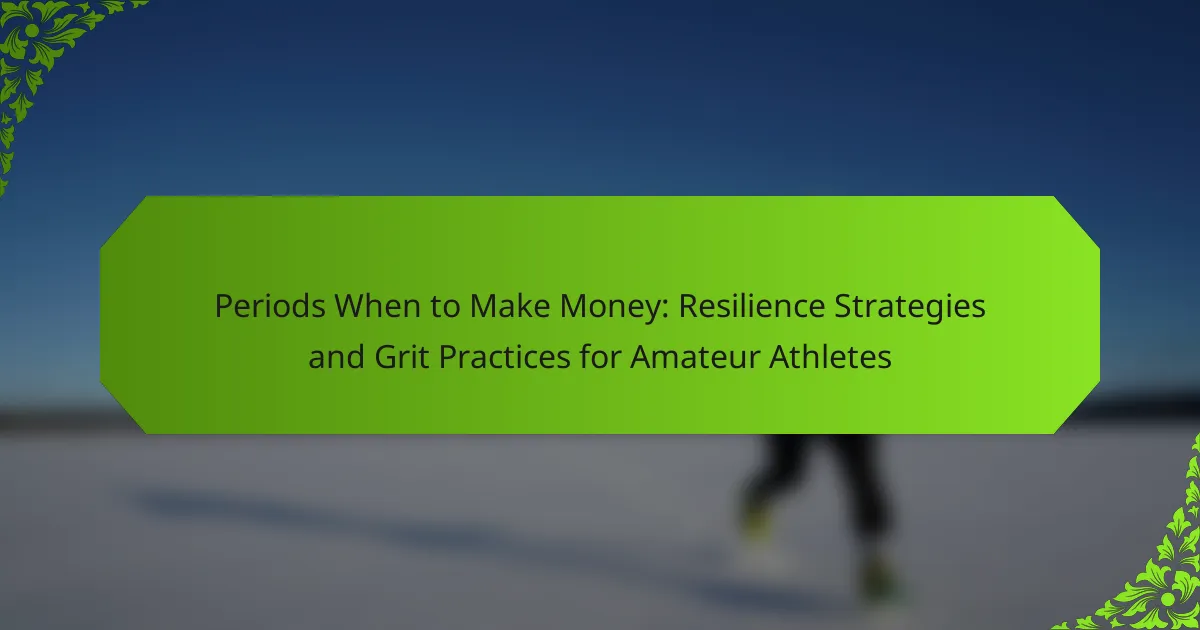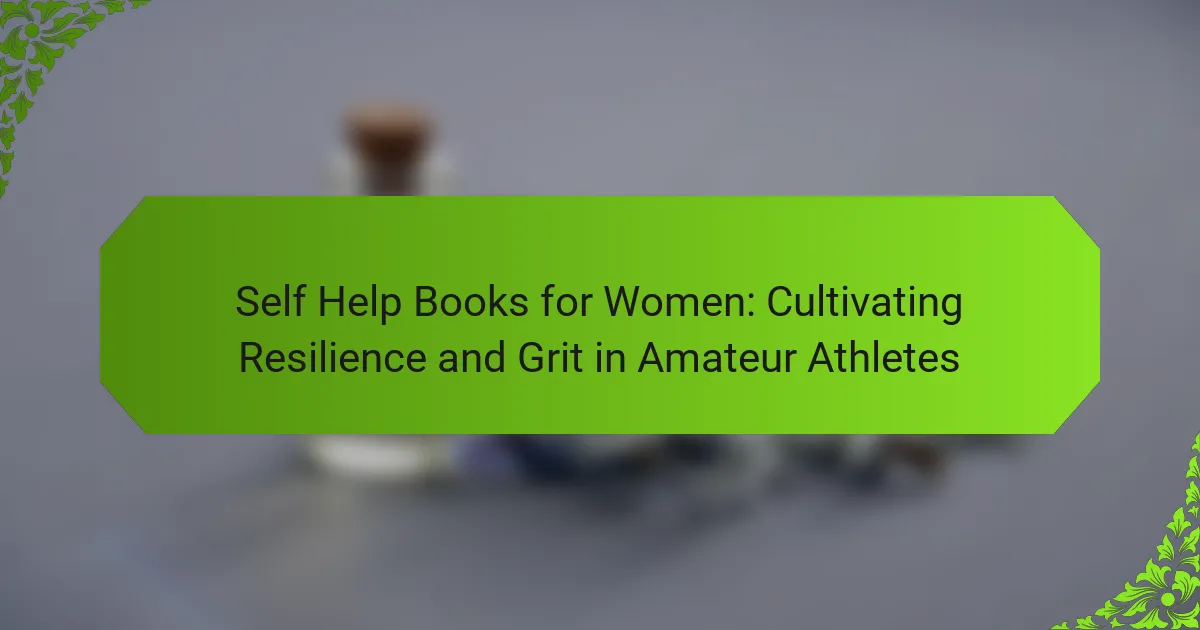Building resilience and grit is crucial for amateur athletes striving for success. Essential reads like “Grit” by Angela Duckworth and “Mindset” by Carol S. Dweck provide strategies for overcoming challenges and fostering mental toughness. These books emphasize the importance of passion, persistence, and a growth mindset. Incorporating their lessons can significantly enhance athletic performance and personal growth.
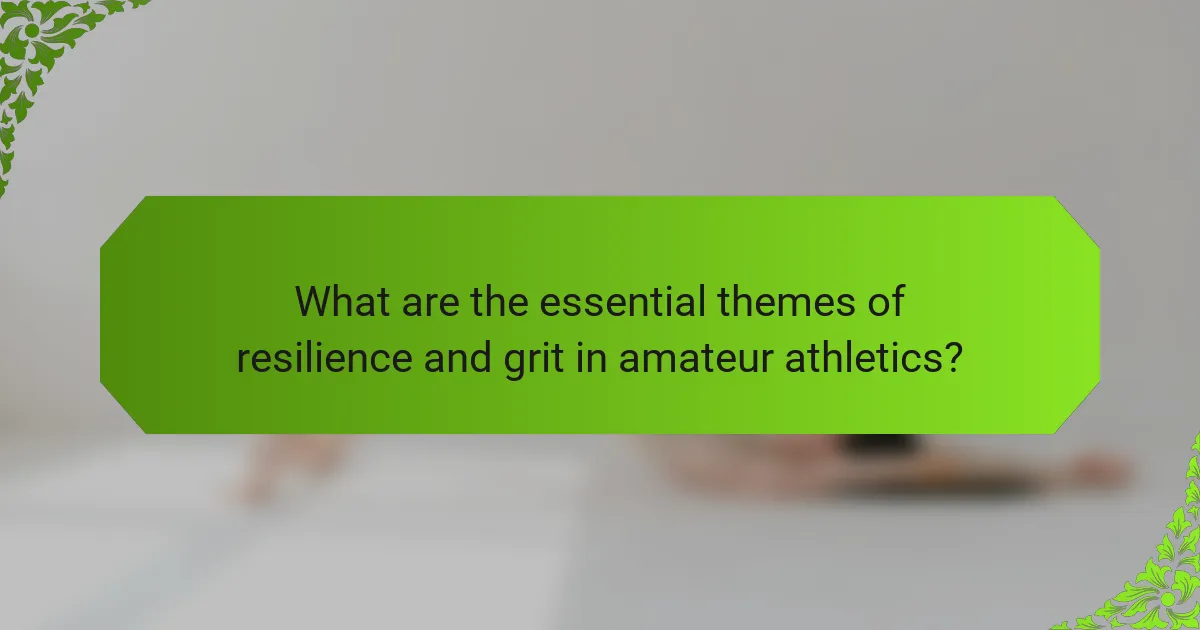
What are the essential themes of resilience and grit in amateur athletics?
Books that focus on resilience and grit significantly impact amateur athletes by enhancing their mental toughness. These essential reads provide strategies for overcoming challenges, building perseverance, and fostering a growth mindset. Titles such as “Grit” by Angela Duckworth emphasize the importance of passion and persistence, while “Mindset” by Carol S. Dweck explores the power of a growth-oriented perspective. Engaging with these texts helps athletes develop the mental fortitude necessary for success in sports. Furthermore, incorporating lessons from these books into training regimens can lead to improved performance and personal growth.
How do resilience and grit contribute to athletic performance?
Resilience and grit significantly enhance athletic performance by fostering perseverance and adaptability. These qualities enable amateur athletes to overcome challenges, maintain focus, and push through adversity. Books focused on resilience and grit provide strategies for developing mental toughness, which is crucial for achieving long-term success in sports. For example, studies show that athletes with higher levels of grit are more likely to persist in their training and improve their skills consistently. Additionally, cultivating resilience helps athletes recover from setbacks, ensuring they remain motivated and engaged in their sport.
What psychological principles underlie resilience and grit?
Resilience and grit are grounded in psychological principles like growth mindset, self-efficacy, and emotional regulation. These principles empower amateur athletes to overcome challenges and maintain motivation.
Books that explore these concepts provide practical strategies for developing resilience. For instance, “Mindset” by Carol Dweck emphasizes the importance of a growth mindset in facing adversity. Similarly, “Grit” by Angela Duckworth highlights perseverance as a key to achieving long-term goals.
Understanding these psychological foundations can enhance an athlete’s performance and personal development. By applying these principles, readers can cultivate resilience and grit, ultimately transforming their approach to challenges in sports and life.
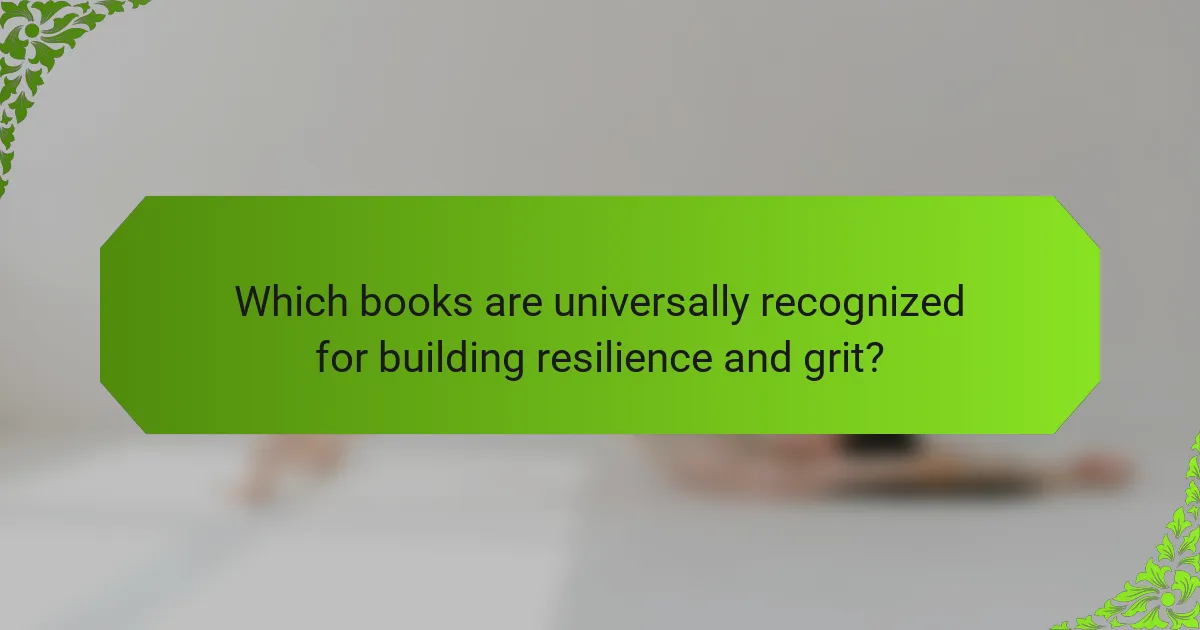
Which books are universally recognized for building resilience and grit?
Books that build resilience and grit include “Grit” by Angela Duckworth, “The Obstacle Is the Way” by Ryan Holiday, and “Mindset” by Carol S. Dweck. These titles offer insights and strategies that foster mental toughness and perseverance. “Grit” emphasizes passion and persistence, while “The Obstacle Is the Way” teaches how to turn challenges into opportunities. “Mindset” explores the power of a growth mindset, which is essential for overcoming setbacks.
What are the key takeaways from “Grit: The Power of Passion and Perseverance” by Angela Duckworth?
The key takeaways from “Grit: The Power of Passion and Perseverance” by Angela Duckworth highlight the importance of sustained effort and resilience in achieving long-term goals. Duckworth emphasizes that talent alone does not guarantee success; instead, passion and perseverance are critical components of grit. She introduces the concept of a “growth mindset,” which encourages individuals to view challenges as opportunities for development. Additionally, Duckworth discusses the significance of setting long-term goals and maintaining motivation through adversity. Her research suggests that grit can be cultivated through practice, mentorship, and a supportive environment, making it a vital attribute for amateur athletes striving for excellence.
How does “The Obstacle Is the Way” by Ryan Holiday teach resilience?
“The Obstacle Is the Way” by Ryan Holiday teaches resilience by emphasizing the power of perspective. The book illustrates that challenges are opportunities for growth. Holiday draws on Stoic philosophy, advocating for acceptance of obstacles as a means to strengthen character. Through historical examples, he demonstrates how individuals have thrived by focusing on their responses to adversity. This approach fosters a mindset that views setbacks as essential for personal development and grit.
What lessons can be learned from “Mindset: The New Psychology of Success” by Carol S. Dweck?
“Mindset: The New Psychology of Success” teaches that adopting a growth mindset fosters resilience and grit in athletes. This mindset encourages viewing challenges as opportunities for growth rather than obstacles. Dweck emphasizes the importance of effort and persistence, which are crucial attributes for amateur athletes facing setbacks. By embracing a growth mindset, athletes can enhance their performance and develop a lifelong love for learning. This perspective helps them navigate the ups and downs of their journey, ultimately leading to greater success and personal fulfillment.
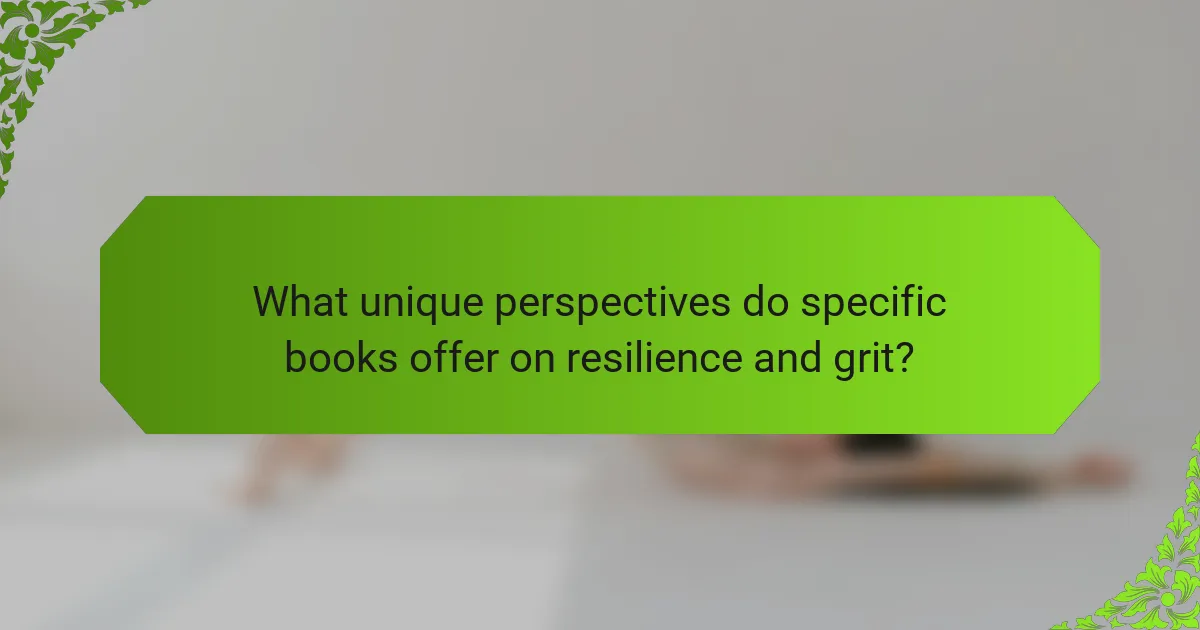
What unique perspectives do specific books offer on resilience and grit?
Books on resilience and grit provide unique insights that inspire amateur athletes. “Grit” by Angela Duckworth emphasizes passion and perseverance as keys to success, illustrating how sustained effort outweighs talent. “The Obstacle Is the Way” by Ryan Holiday draws on stoic philosophy, teaching that challenges can be transformed into opportunities for growth. “Mindset” by Carol S. Dweck explores the power of a growth mindset, showing how beliefs about abilities can influence performance. Finally, “Can’t Hurt Me” by David Goggins shares personal stories of overcoming adversity, emphasizing mental toughness and discipline. Each book offers distinct perspectives that empower athletes to build resilience and grit.
How does “Can’t Hurt Me” by David Goggins redefine limits?
“Can’t Hurt Me” by David Goggins redefines limits by challenging conventional beliefs about mental and physical endurance. Goggins emphasizes the importance of pushing through pain and discomfort to achieve extraordinary results. His life story illustrates resilience, showcasing how overcoming adversity leads to personal growth. The book serves as a guide for amateur athletes, encouraging them to embrace struggle as a pathway to success. Goggins’ unique approach to self-discipline and accountability inspires readers to break free from self-imposed limitations.
What insights does “The Champion’s Mind” by Jim Afremow provide for amateur athletes?
“The Champion’s Mind” by Jim Afremow offers valuable insights for amateur athletes by emphasizing mental resilience and focus. The book teaches techniques to enhance performance through visualization, goal-setting, and developing a champion’s mindset. It highlights the importance of positive self-talk and maintaining motivation during challenges. Afremow also discusses the role of mental preparation in achieving peak performance, making it essential reading for athletes seeking to build grit and resilience.

What rare but impactful reads should amateur athletes consider?
Amateur athletes should consider reading “The Obstacle Is the Way” by Ryan Holiday, “Mindset: The New Psychology of Success” by Carol S. Dweck, and “Grit: The Power of Passion and Perseverance” by Angela Duckworth. These rare but impactful reads focus on resilience, mental toughness, and the importance of a growth mindset. Each book offers unique insights that can transform an athlete’s approach to challenges and setbacks.
How can “The Art of Resilience” by Ross Edgley inspire athletes?
“The Art of Resilience” by Ross Edgley inspires athletes by showcasing the power of mental strength and perseverance. Edgley emphasizes that resilience is not just about physical endurance but also about overcoming psychological barriers. His journey of swimming around Great Britain highlights the importance of grit and adaptability in the face of challenges. The book provides practical strategies and motivational insights that encourage athletes to embrace discomfort and push their limits. By sharing personal stories and lessons learned, Edgley cultivates a mindset that can transform setbacks into opportunities for growth.
What strategies does “Relentless: From Good to Great to Unstoppable” by Tim S. Grover offer?
“Relentless: From Good to Great to Unstoppable” by Tim S. Grover offers strategies focused on mental toughness, discipline, and relentless pursuit of goals. Grover emphasizes the importance of a winning mindset, resilience in the face of adversity, and the need to push beyond comfort zones. He categorizes individuals into three types: the cooler, the closer, and the cleaner, urging readers to strive to be a cleaner. Key strategies include setting high standards, embracing failure as a learning opportunity, and maintaining an unwavering commitment to personal excellence. Grover’s insights are particularly valuable for amateur athletes seeking to build resilience and grit.

How can amateur athletes implement lessons from these books into their training?
Amateur athletes can implement lessons from these books by adopting key strategies that enhance resilience and grit. Focus on setting specific goals to track progress effectively. Develop a consistent training routine that incorporates mental and physical challenges. Embrace failure as a learning opportunity, fostering a growth mindset. Utilize visualization techniques to enhance performance and maintain motivation. Implement self-reflection practices to assess improvement and adjust training methods accordingly.
What are the best practices for cultivating resilience in sports?
To cultivate resilience in sports, amateur athletes should focus on developing a growth mindset, setting achievable goals, and learning from setbacks. Reading books that emphasize grit, perseverance, and mental toughness can significantly enhance these skills. Engaging with literature such as “Mindset” by Carol Dweck and “Grit” by Angela Duckworth provides valuable insights into building resilience. These resources offer practical strategies for overcoming challenges and maintaining motivation, essential for success in sports. Additionally, incorporating visualization techniques and positive self-talk can further strengthen an athlete’s mental fortitude.
How can athletes avoid common mistakes when applying grit principles?
Athletes can avoid common mistakes when applying grit principles by focusing on consistent effort and learning from failures. Emphasizing the importance of a growth mindset enables athletes to view challenges as opportunities. Books that emphasize resilience, such as “Grit” by Angela Duckworth, provide strategies to maintain motivation and persistence. Additionally, setting specific, measurable goals helps athletes track progress and stay committed. Regular reflection on performance and seeking feedback can further enhance their understanding and application of grit principles.
What expert insights can enhance the application of these readings?
Expert insights can significantly enhance the application of readings on resilience and grit for amateur athletes. Incorporating practical exercises from these books can foster mental toughness. Engaging with a mentor who embodies these qualities can provide real-world perspectives. Setting specific, measurable goals based on insights from the readings can track progress effectively. Additionally, creating a supportive community for sharing experiences can reinforce the lessons learned.
